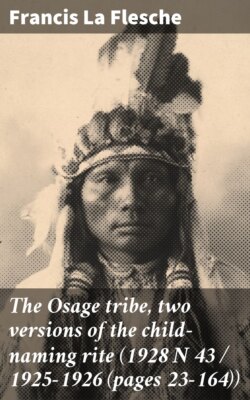Читать книгу The Osage tribe, two versions of the child-naming rite (1928 N 43 / 1925-1926 (pages 23-164)) - Francis la Flesche - Страница 38
На сайте Литреса книга снята с продажи.
12
Оглавление99. There lacks one more, O, younger brothers, they said to one another.
100. You will go forth and make further search.
101. Even as these words were spoken,
102. One hastened to the farther borders of the lake,
103. Where sat the do (Apios apios). 104. Close to it he stood, 105. Then he hastened home, carrying the plant with him. 106. Standing before his brothers, he spake, saying: O, elder brothers, 107. How will this serve for food? 108. They replied: O, younger brother, 109. That is the very object for which you have been searching. 110. The elder brothers hastened to try the taste of the root, 111. Like milk the juice squirted in their mouths. 112. Then they spake, saying: The little ones shall use this plant for food. 113. When the little ones use this plant for food, 114. They shall always live to see old age. 115. It shall make their limbs to stretch in growth, as they travel the path of life.
When Wa-xthi´-zhi made up his mind to give a description of the Child-naming Ritual of his own gens, the Puma, he did not hesitate to recite the wi´-gi-es and to tell of the ceremonial forms that accompany the entire ritual. But when asked to recite the wi´-gi-es of the 11 gentes who were summoned to take part in the ceremony of conferring a name upon a Puma child he declined to give them, although he knew all of them, for the reason that they were not his to give. He had not obtained from any of these gentes the right to transfer them to strangers or to members of other gentes.
It so happened that when Wa-xthi´-zhi was describing the Child-naming Ritual of his own gens, which he had a perfect right to do, Wa-sho´-she (pl. 4), a member of the Hoⁿ´-ga A-hiu-ṭoⁿ gens, was present. This man, when asked if he would be willing to give the U´-noⁿ Wi´-gi-e (Old-age Wi´-gi-e) of his gens for a fee, promptly replied that he would. He had obtained by purchase from his father the wi´-gi-e and so had acquired the right to transfer it to anybody, but the transfer must always be made for a fee. The fee was provided and Wa-sho´-she sat down and recorded the Old-age Wi´-gi-e of his own gens, the Hoⁿ´-ga A-hiu-ṭoⁿ. This name refers to the “Stainless Bird,” the mottled eagle, who conducted the Hoⁿ´-ga people to earth from mid-heaven. (See 36th Ann. Rept. Bur. Amer. Ethn., p. 162, lines 177 to 199.)
BUREAU OF AMERICAN ETHNOLOGY
FORTY-THIRD ANNUAL REPORT PLATE 3
SHELL GORGET AND DOWNY PLUME (LIFE SYMBOLS)
BUREAU OF AMERICAN ETHNOLOGY
FORTY-THIRD ANNUAL REPORT PLATE 4
WA-SHO´-SHE (HON´-GA A-HIU-TON (EAGLE) GENS)
The first seven lines of the wi´-gi-e refer back to the time when “the Hoⁿ´-ga who possess seven fireplaces” chose for one of their life symbols the “Stainless Bird,” the mottled eagle. The people who are here spoken of as the Hoⁿ´-ga having seven fireplaces are those who compose the seven gentile groups that represent the land portion of the earth in the two great tribal divisions symbolizing the cosmos. These seven gentile groups (seven fireplaces) are, as given by Black-dog. (See 36th Ann. Rept. Bur. Amer. Ethn., pp. 52–53.)
1. Wa-ça´-be-ṭoⁿ, They-who-own-the-black-bear.
2. Iⁿ-gthoⁿ´-ga, Puma.
3. O-poⁿ, Elk.
4. Moⁿ-iⁿ-ḳa-ga-xe, Makers-of-the-earth.
5. Hoⁿ´-ga gthe-zhe, The-mottled-sacred-one.
6. Xu-tha´, Eagle (the adult golden eagle).
7. Hoⁿ´-ga zhiⁿ-ga, The-little-sacred-one.
When the “Hoⁿ´-ga, a people who possess seven fireplaces” went to the “Stainless Bird” and said to him (lines 5, 6, and 7): “The little ones have nothing of which to make their bodies,” meaning that they have no symbol for the long life which they crave, he replied in the words as given in the wi´-gi-e, from line 10 to the end:
